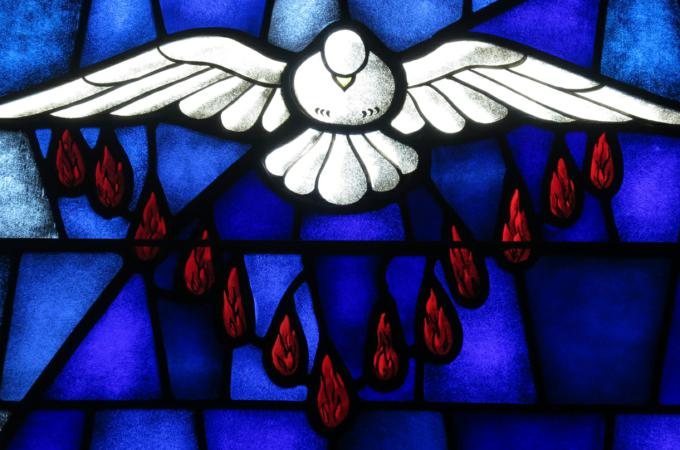Aflame
And with Pentecost, we return to Ordinary Time. Just like that. The paschal candle is no longer front and center, the Easter lilies are gone, and the extra alleluias have retreated. The incense and holy water that mark the liturgical pageantry of Holy Week and the joy of the Resurrection have disappeared into safe-keeping once again.
At least this year, Ordinary Time feels a lot more ordinary than it did last year. More people and fewer masks make it seem almost normal, and almost as if Easter really did come at the end of what has been an almost endless Lent. Almost.
It's true that there is something very powerful in the recognition that God is just as present to us in the mundane as he is in the extraordinary. The seasons of our lives that don't feel much like seasons at all are fertile soil for cultivating virtue and spiritual life. That's where most of our lives unfold.
But "Ordinary Time" is relatively new for the Church. Before 1970, the entire Church year was liturgically connected to a major feast. Older Catholics might recall celebrating the Sundays after Epiphany before Lent and the Sundays after Pentecost during the long procession of weeks between Pentecost and Advent. All of Christian life was lived out in the radiance of the Life of Christ.
It made sense because, technically, we are still living in the age after Pentecost. The Holy Spirit has been poured out on the Church, as promised. The worldwide mission of spreading the Gospel, of making disciples of all nations, is still our agenda. But what we seem to have lost is the sense that all our days -- in fact, all our lives -- can and should be empowered by the grace of the Holy Spirit. Ordinary Time can only be filled with sanctifying grace because of Pentecost.
At the risk of further stirring up the already bubbling liturgical cauldron, I'd suggest that it might be advantageous to hold on to both perspectives: to recognize God's grace in our everyday lives and to connect our lives to the living font of the Holy Spirit that fills us -- not just "them" -- ever since Pentecost.
Why? To borrow a song title from Kermit the Frog, "It's Not Easy Bein' Green." Keeping faith at the center of our lives can be harder when the Church isn't focusing our attention on anything in particular. Liturgy demands more of us when the prayer of the Church isn't preparing us for something to come or drawing us more deeply into a particular aspect of the mystery of Christ.
We need Pentecost. I mean, look at us! We're afraid to do much of anything in the name of Jesus because we just might offend someone. Most of us are no longer moving outward, but inward to isolation. We hardly begin to speak before we shut up again, keeping the truth of Jesus Christ -- the life-giving truth of salvation -- to ourselves. That is not what being filled with the Holy Spirit looks like.
Remember, when the Spirit fell on the disciples gathered with Mary in the Upper Room, courage replaced cowardice and fervor replaced fear. The disciples of Jesus were transformed. The Spirit gave them authority and power, not to contain salvation among themselves, but to share it publicly. They burst out of their safe space and boldly proclaimed the truth of the Gospel to the whole world. Luke writes, "All of them were filled with the Holy Spirit and began to speak in other languages, as the Spirit gave them ability" (Acts 2:4).
God has given us his Holy Spirit, too. But we must learn to live our ordinary lives in the reality of that great mystery. Ordinary Time can and should be lived consciously in the wake of Pentecost. God is with us. God is here. His fire is still burning and it can set our hearts aflame.
- Jaymie Stuart Wolfe is a Catholic convert, wife, and mother of eight. Inspired by the spirituality of St. Francis de Sales, she is an author, speaker, and musician, and provides freelance editorial services to numerous publishers and authors as the principal of One More Basket. Find Jaymie on Facebook or follow her on Twitter @YouFeedThem.



















